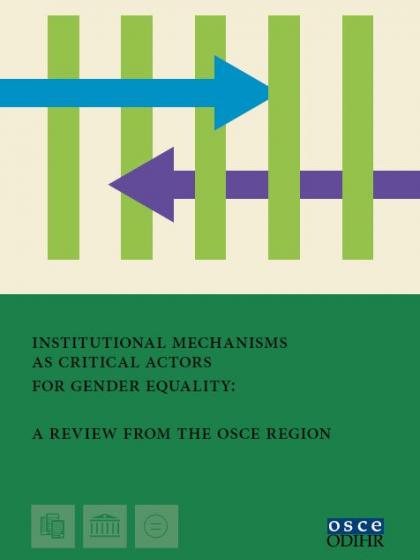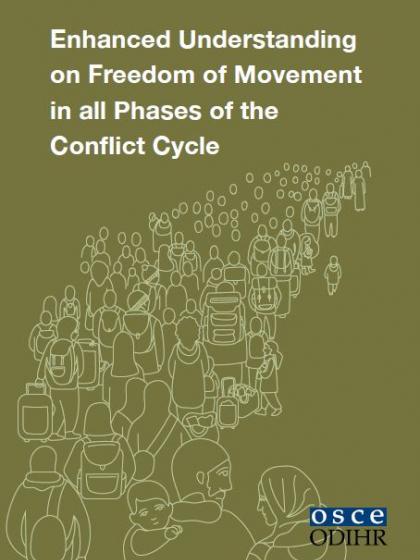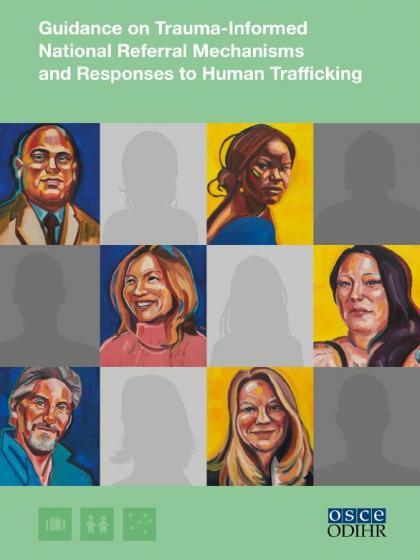Publications
Guidelines for Activists Addressing Roma and Sinti Evictions
Publishing date: 21 December 2023
Content type: Guide / manual / handbook
Where we are: OSCE Office for Democratic Institutions and Human Rights
What we do: Roma and Sinti
Publisher: Organization for Security and Co-operation in Europe
The purpose of this guide is to give Roma and Sinti activists an easily accessible overview of the relevant international and regional human rights standards on forced evictions, with a particular focus on the findings of international and regional human rights tribunals in relation to Roma and Sinti evictions. In addition, by including numerous references to the judgments and decisions of international human rights courts, Roma and Sinti activists can familiarize themselves with these decisions and draw them to the attention of the non-governmental organizations (NGOs) and human rights lawyers with whom they cooperate. These can then be incorporated into their legal advocacy and litigation, rendering them more effective.
ODIHR Public Ethics and Integrity Toolkit: Guidelines for Parliaments
Publishing date: 11 December 2023
Content type: Guide / manual / handbook
Where we are: OSCE Office for Democratic Institutions and Human Rights
What we do: Democratization, Good governance
Publisher: Organization for Security and Co-operation in Europe
This tool is designed to support national parliaments in OSCE participating States in developing parliamentary integrity systems. It provides a concise roadmap for designing and implementing a code of conduct for MPs from scratch, as well as guidance for parliaments that want to improve their existing integrity systems.
Institutional Mechanisms as Critical Actors for Gender Equality: A Review from the OSCE Region
Publishing date: 16 November 2023
Content type: Guide / manual / handbook
Where we are: OSCE Office for Democratic Institutions and Human Rights
What we do: Democratization, Gender equality
Publisher: Organization for Security and Co-operation in Europe
Institutional mechanisms for the advancement of women and gender equality have a unique potential for making women’s and men’s lives better and, more generally, making democracies stronger, more resilient and egalitarian. In these challenging times for democracy, institutional mechanisms play an important role in preventing the reversal of gender equality in practice.
Enhanced Understanding on Freedom of Movement in all Phases of the Conflict Cycle
Publishing date: 7 November 2023
Content type: Guide / manual / handbook
Where we are: OSCE Office for Democratic Institutions and Human Rights
What we do: Democratization, Border management, Migration
Publisher: Organization for Security and Co-operation in Europe
Since the Helsinki Final Act of 1975, the OSCE region has experienced a number of conflicts that have not only destabilized the region but have also had a very negative impact on human rights and fundamental freedoms, triggering grave humanitarian consequences and human suffering. Unfortunately, the tensions, crises and conflict situations continue to this day. In 2023, according to UNHCR, displacement has reached approximately 27 million, including internal displacement within the OSCE region. This number includes those displaced from Ukraine since February 2022. At times of conflict, protection under International and Regional Human Rights Law and International Refugee Law is complemented by the protection offered under International Humanitarian Law, all mirrored in OSCE Commitments.
Recommendations on Judicial Independence and Accountability (Warsaw Recommendations), 2023
Publishing date: 27 October 2023
Content type: Guide / manual / handbook
Where we are: OSCE Office for Democratic Institutions and Human Rights
What we do: Democratization, Rule of law
Publisher: Organization for Security and Co-operation in Europe
In 2019, in response to numerous requests for guidance on issues related to judicial independence falling outside the geographic and thematic scope of the Kyiv Recommendations, ODIHR initiated a comprehensive consultative and expert-driven process to ensure that its recommendations on judicial independence respond effectively to current challenges. The inaugural meeting of a core group of experts convened in Warsaw, followed by extensive further assessment of the thematic areas in focus. The Recommendations on Judicial Independence and Accountability (Warsaw Recommendations) are the result of this review process.
ODIHR Brief: Guiding Principles of Democratic Lawmaking and Better Laws
Publishing date: 6 October 2023
Content type: Brochure
Where we are: OSCE Office for Democratic Institutions and Human Rights
What we do: Democratization
Publisher: Organization for Security and Co-operation in Europe
Given the ongoing erosion of democratic and constitutional standards and the rule of law across the world, and declining public trust in democratic institutions, it is essential to strengthen democratic institutions and processes by promoting openness, transparency, inclusiveness and accountability in lawmaking. Contemporary lawmaking displays a number of weaknesses, including a lack of proper policy discussions, impact assessments or public consultations before drafting a law and the practice of sidelining democratic institutions throughout the legislative process. In principle, lawmaking procedures and practices should follow democratic principles, adhere to the rule of law and comply with international human rights obligations and standards. A democratic lawmaking process not only leads to better laws but usually improves the implementation of the adopted laws, ultimately enhancing public trust in democratic institutions and processes.
OSCE/ODIHR Election Observation to the 2023 Parliamentary Elections in Poland
Publishing date: 22 September 2023
Content type: Factsheet
Where we are: OSCE Office for Democratic Institutions and Human Rights
What we do: Elections
Publisher: Organization for Security and Co-operation in Europe
This factsheet explains the purpose of the Limited Election Observation Mission to Poland's 2023 Parliamentary Elections.
Introduction to the Nelson Mandela Rules International Training Programme, Trainer’s Manual
Publishing date: 20 September 2023
Content type: Guide / manual / handbook
Where we are: Troika, OSCE Office for Democratic Institutions and Human Rights
What we do: Human rights
Publisher: Organization for Security and Co-operation in Europe
This publication has been developed to guide trainers leading 4-day in-person training courses for prison staff designed by the OSCE’s Office of Democratic Institutions and Human Rights (ODIHR) and Penal Reform International (PRI) in partnership with the Swedish Prison and Probation Service (SPPS) and the United Nations Office on Drugs and Crime (UNODC).
Handbook for the Observation of Election Administration
Publishing date: 10 September 2023
Collections: Election handbooks
Content type: Guide / manual / handbook
Where we are: OSCE Office for Democratic Institutions and Human Rights
What we do: Elections
Publisher: Organization for Security and Co-operation in Europe
Organizing elections and referenda is indisputably a challenging task. Bodies in charge of administering elections and referenda (EMBs) have the demanding function of ensuring that many complex election- and referenda-related processes are managed efficiently, impartially and transparently. The work of the EMBs has a direct impact on the quality and integrity of electoral and referendum processes and is one of the keys to ensuring the rights of voters and contestants. The EMBs are therefore one of the main guardians of democratic elections, and their activities are central to fostering public confidence.
Guidance on Trauma-Informed National Referral Mechanisms and Responses to Human Trafficking
Publishing date: 22 August 2023
Content type: Guide / manual / handbook
Where we are: OSCE Office for Democratic Institutions and Human Rights
What we do: Combating trafficking in human beings
Publisher: Organization for Security and Co-operation in Europe
Survivors need to have confidence in the systems designed to identify and protect them, to give them the best chance of accessing services, staying with them and remaining safe. Therefore, NRMs should provide a structural set up for trauma-informed frameworks and procedures, and function as a natural ‘home’ for professional, trauma-informed methods of working. NRMs must ensure respect for the human rights and dignity of all adults and children who are victims of trafficking. There should be clear recognition in anti-trafficking law, policy and related guidance — and therefore recognition across all relevant NRM sectors and by all service providers — that victims of human trafficking should be treated as a distinct category of vulnerable people in need.










